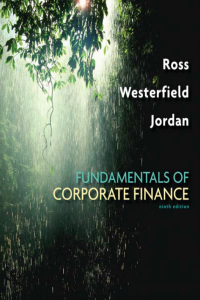Principles Of Corporate Finance fourteenth edition
Principles Of Corporate Finance 14th Brealy, Myers, Allen, Edmans.
Đặt in thành sách tại HoaXanh, xem sách in mẩu trong video bên dưới.
- 395,000đ
- Mã sản phẩm: PR6011
- Tình trạng: 2
What has changed in this edition? You will have seen the first change on the cover: Alex Edmans has joined the author team. Alex is a global authority in corporate finance, with particular expertise in corporate governance, responsible business, and behavioral finance— three areas we have significantly bolstered as we will shortly describe. In addition to being a leading researcher, he has substantial practitioner expertise. He has also won a multitude of teaching awards at MIT, Wharton, and London Business School and is particularly noted for the ability to explain complex finance concepts in simple language. He recently gave a year-long Gresham College public lecture series on the principles of finance attended by a diverse audience, from schoolchildren to retirees. This expansion of the author team has led to a number of important changes. For example, in recent years many observers have questioned companies’ focus on profits and have suggested that managers should promote the interests of all stakeholders rather than simply seeking to maximize shareholder value. The issue is an important one and we have, therefore, added a new chapter, Chapter 20, that discusses these different corporate objectives, how far they conflict, and how a responsible business should behave. The structure of a firm’s governance is closely related to its objectives. We have therefore moved the material on corporate governance and agency issues to Chapter 19, where it now sits next to the chapter on corporate objectives. This chapter has also been substantially rewritten. Other chapters with major changes include the two chapters on the pricing of risky assets (Chapters 7 and 8). Chapter 7 now focuses on portfolio choice and a stock’s effect on portfolio risk, while Chapter 8 concentrates on asset pricing. This is a clearer separation of topics than in previous editions; we think that it is more logical and helps understanding. The discussion of market efficiency (Chapter 12) has also undergone substantial revision with additional and updated sections on empirical evidence. The chapter also contains an expanded discussion of behavioral finance and the evidence for behavioral biases. Financial innovation today is being driven by technological developments such as artificial intelligence, big data, and cloud computing. Chapter 13 now includes a new section that reviews seven ways in which financial technology is changing financial practice.









